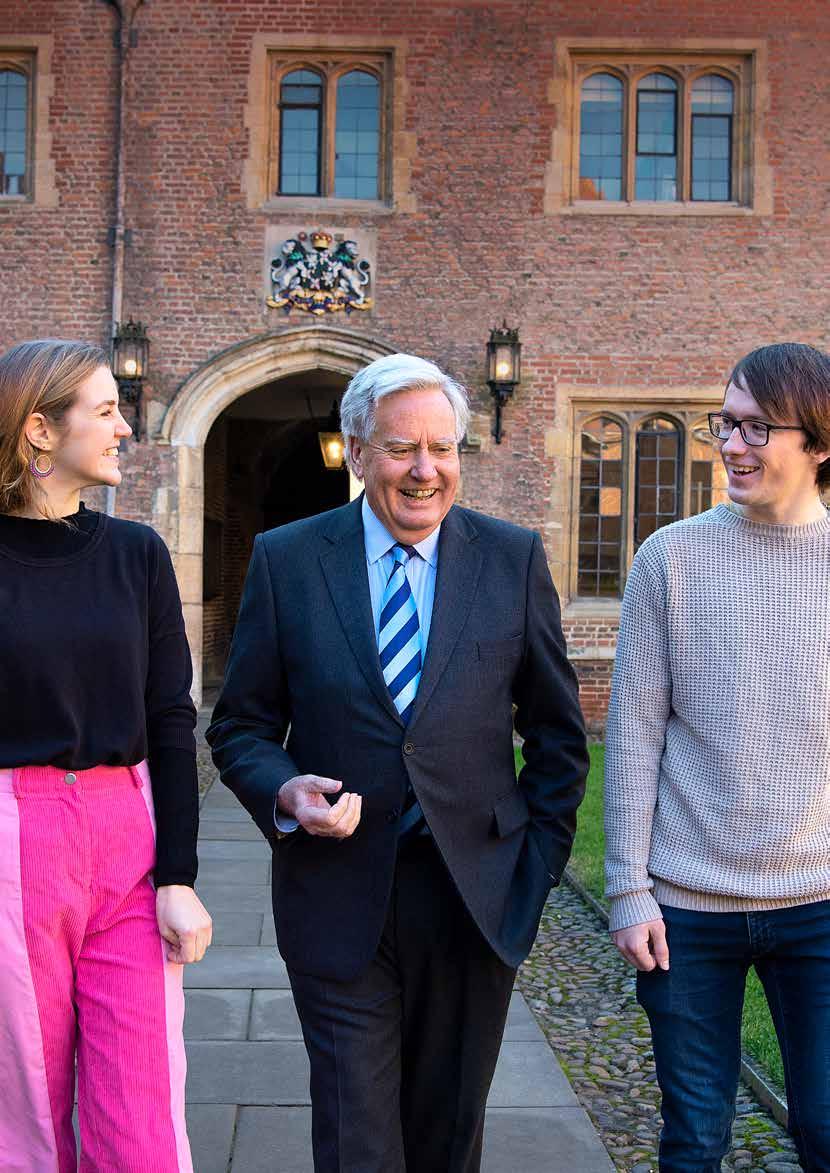

this issue
10–11 A Dispatch from the Valerie Eliot Bequest
12–13 A Night to Remember: Looking Back at Magdalene’s May Balls 14–16 Inside the Magdalene Kitchens
Welcome
Dear Members,
We welcomed many of you to a special celebration we arranged to celebrate the 300th anniversary of the arrival of the Pepys Library in 1724, with a programme culminating in a remarkable concert and a special feast reminiscent of that time. The sight of now unfamiliar musical instruments, which would have been so easily recognisable to Samuel Pepys (including his own spinet!), and the sound of Henry Purcell’s music in Chapel reminded those present of the pleasure of celebrating our shared history as a College.
The extensive restoration of the Pepys Building is now well underway, and once again, the global Magdalene community has come together to fund this important project with generous donations, thank you. We already look forward to the reopening of the Pepys Building in late 2026, when we will be able to celebrate yet another fantastic and important project completed with the help of so many – just like we did with the New Library.
The support of Members everywhere, in Cambridge, New York, Manchester, Singapore, Kuala Lumpur, Westminster Abbey in London and Hong Kong, to name just a few locations where we have come together this year alone, is simply wonderful. The ongoing interest in the College, the loyalty and the undiminished affection so many Members share for Magdalene ensures enduring connections with the College, but also among alumni. Do keep coming to our events, you can find details on the alumni pages on the website, which will have a fresh new look by the summer. You can read about the history of Magdalene, about College life today, find information about events and reunions, attending Evensong, merchandise, learn about the benefits for Members and how to support your College.
With best wishes for a lovely summer,
CORINNE LLOYD Editor and Director of Development
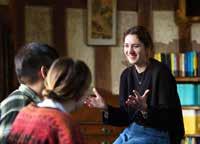

Magdalene Matters is published by the Alumni and Development Office. For further information or if you would like to submit content for future issues please contact the Communications Manager, Mr Matthew Moon, or the Editor, Mrs Corinne Lloyd.
The views expressed in this publication do not necessarily represent the views of Magdalene College Cambridge.
Cover photo taken by Stephen Bond.
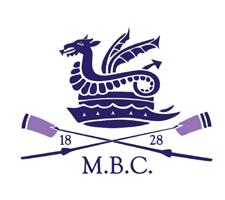
OLD HABITS DIE HARD
by The Reverend Sarah Atkins (2002), Dean of Chapel
Apart from the rowers, early risers are not often spotted in First Court before dawn on a February morning. But something caught the imagination of the scores of students who found themselves in Chapel at 6am one day last Term. It was an unusual scheme: a day in the life of the Magdalene’s first students, the Benedictine monks. Every three hours, we were invited to dip into the rhythms they might have known, from daybreak until nightfall, with Latin plainchant psalms and prayers at 6am Lauds (followed by a hearty breakfast), then 9am Terce, 12pm Sext, 3pm None, 6pm Vespers and finally 9.30pm Compline
As well as offering worship, the experience revealed things about who we are. For those like me who attended it all, the frequent interruptions challenged us to allow the day to have a purpose beyond achieving the tasks at hand, receiving the gift of time in a town that idolises rush. For any who dropped in for an intentional break before lunch or heading to the library, we realised, through the gift of sacred words and music, just how close below the surface, is our hunger and capacity for the deep things of life, right in the middle of our day’s work and preoccupations.
We are proud that our Chapel is a very popular place for people of all faiths and none, and everything in between. The space and events are emphatically open to people who seek a space for reflection and encounter without a religious frame of reference, alongside our support for other faith traditions. But what underpins this openness, what makes that unequivocal welcome possible, is rootedness in a particular tradition, inspired by the Benedictines, embodied by our medieval Chapel. The Magdalene monks of nearly 600 years ago might struggle to recognise our students today. But, sitting in our beautiful Chapel on that day, interrupting our work and study with
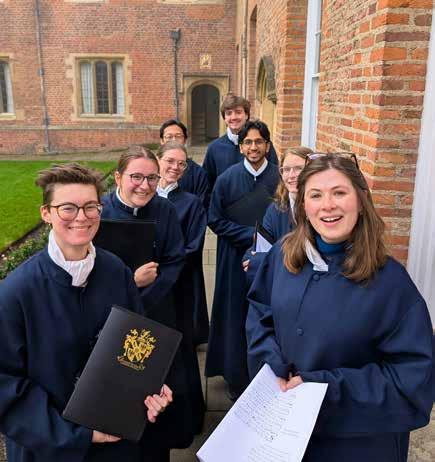
such similar liturgy, ending the day in the companionable dark of shared mortality and hope, we weren’t so very far from each other.
The first word of the Rule of St Benedict is, famously, Listen (‘Obsculta’, “Listen attentively, with the ear of your heart”). He goes on to inspire his monks to mutual listening, living in a community where we ask this listening of each other, and where we promise it in return. The pastoral work of the Chapel and the Chaplain is all about making space for listening and encouraging it as the essence of our College community. When we listen to each other in our interfaith gatherings, in small groups or 1:1 pastoral care, at the C. S. Lewis readings, or the termly Chapel curry packing out the Hall, or even when
we listen to each other holding the silence, we are offering that other great Benedictine hallmark, hospitality. Benedict tells his monks to welcome each stranger as though welcoming Christ himself. Some Benedictines give themselves a reminder of this by writing above their door the simple phrase ‘Laus Deo’, praise God (the phrase which is also said, incidentally, at the end of Hall). It’s not always the first thing that comes to mind when an unexpected visitor knocks at your door, but it’s what keeps us human, because it means we receive what is not us as a gift; we can welcome other thoughts and people because we know we can’t know it all on our own. That, of course, is what keeps the College a College. And it’s worth getting up for, according to the students.
The choir ready for the 9am Terce.
Pepys Building Restoration Gathers Pace
by Professor Tom Spencer (1973), Chair of the Pepys Restoration Project Board
In Magdalene Matters for Spring/Summer 2024, our architect, Robert Montgomery, outlined the vision for the top to bottom renovation of the Pepys Building; 12 months on, that vision is starting to become a reality.
The current phase is one of critical enabling works, providing the cabling for an improved power supply into the building and getting to the point where our contractor will have a clean empty shell.
All the resident Fellows, their books and belongings, have been re-housed elsewhere and the remaining books from the old College Library moved out. Most importantly, there has been an elaborate dance of meticulously decanting the Pepys Library books and Pepysian furniture to a safe and secure location in College, with the opportunity to carry out the restoration of the Pepys’ book presses as part of this process. With the building empty, we have gone on to undertake a soft strip of the old College Library bookcases and desks,
revealing the building’s timber and brickwork skeleton for the first time since the alterations undertaken 65 years ago.
In parallel, the College’s Pepys Restoration Team has been hard at work on the design questions which relate to Right Cloister, with the new entrance foyer and seminar room on the ground floor and the new exhibition space on the first floor. Improving accessibility has been a core concern in all these discussions. We are also busy making decisions on new heating, lighting and IT systems, and approving new roof tiles and rainwater goods. We now move on to the tendering process for the project’s main contractor and expect to shift from getting ready to really getting going in July 2025.
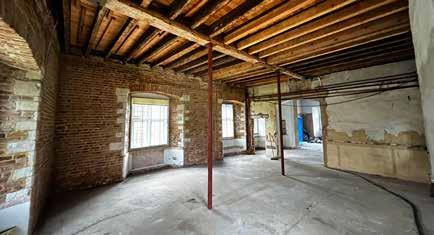


The former College Library in Right Cloister, now stripped out and ready for restoration to begin.
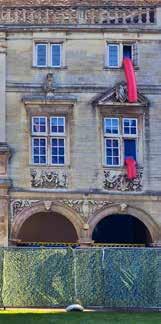

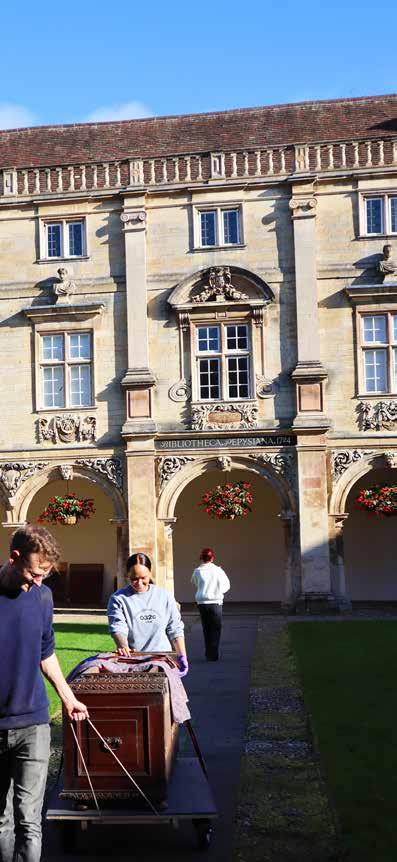

working with heritage buildings
by Sir Loyd Grossman CBE (2008), Chair of the Royal Society of Arts (RSA)
Architecturally, Magdalene is the most modest of the University’s ancient Colleges, but certainly not the least interesting. First Court, inexplicably clad in plaster until the 1950s, is for me one of the great spaces in Cambridge: cosy, domestic and quintessentially English.
Magdalene’s tradition of bad luck with its early patrons and lack of considerable land holdings, unlike its richer and grander neighbours, consigned the College to a sort of genteel poverty and a consequent lack of grand architectural gestures. Even the large and, by Magdalene standards, lavish commission of the Lutyens Building took a distinctly Magdalenean turn when a failed fundraising appeal meant that the whole, much larger scheme had to be cut back. Considering Lutyens’ flair for bigstatement architecture, the resulting block is pretty self-effacing.
The more recent history of College building is altogether more encouraging. The brilliant New Library was a worthy winner of the Stirling Prize and an exceptionally comfortable, efficient, and inspiring place in which to work. Now attention is turned to the Pepys Building, long neglected, but certainly the most distinctive and intriguing of all the College buildings. Intriguing, because its authorship is unknown. There is the definite influence of Wren, England’s dominant architect during the long period – most of the second half of the seventeenth century – of its planning and construction, but there is some direct involvement by Robert Hooke, Wren’s friend and collaborator on the rebuilding of London after the Great Fire. Whoever designed it created a picturesque mash-up of English vernacular meets Italianish Baroque, resulting in a fine and distinctive home for the treasures of Samuel Pepys’ own Library.
The restoration and renewal of the Pepys Building will make a splendid addition to the College’s facilities and provide a warm and scholarly welcome to the wider world. Our architectural heritage reminds us of Magdalene’s enduring values and mission, never looking backwards, but using our history as a springboard into the future.
by Mr Gareth Hart (2018)
land’s end to john o Astride a Charging FROM MAGDALENE TO MOLECULES
The electric vehicle revolution is upon us and I’m sure some of you reading this will have an electric car on the drive, or at least know someone who has.
Delivery over depth. This is one view of industrial science. It is the view that scientific curiosity is always discarded in favour of the pressing need for product delivery and wider commercial and societal impact. Yes, this is certainly true to some extent – without customers and a sensible balance sheet, there cannot be long-lasting research and development. Yet, there can be a happy medium. Since leaving Magdalene in 2021, my experience as a Research Scientist at Johnson Matthey has shown me that there remains ample opportunity for exceptional science and tangible impact outside of academia.

In my view, the recipe for exceptional impact combines the relentless pursuit of knowledge (commonly found in a university environment) with the ability to rapidly develop and scale-up breakthroughs (commonly found in an industrial environment). The Royal Commission for the Exhibition of 1851’s Industrial Fellowship, which I was incredibly grateful to have recently been awarded, epitomises this. This prestigious award supports Fellows in their ambitions to make an outstanding contribution to industry by providing funding for their work and supporting the dissemination of this work as a PhD degree. The wider programme of Fellowships brings together entrepreneurs, architects, engineers, and teachers to crosspollinate. Because of this, I cannot help but compare to the Magdalene community I enjoyed as an undergraduate and see obvious similarities. I am thankful to have experienced such enriching conversations in the Magdalene formal hall and to have had my thoughts and ideas regularly challenged. It meant that talking about my work during my interview to esteemed Magdalene alumna Dame Sarah Springman and later to Her Royal Highness The Princess Royal at a Fellowship dinner was not as challenging as it could have been!
My research focuses on improving upon and making new materials which enable us to use electricity to split water molecules apart to produce hydrogen. This is called water electrolysis and, if using renewable electricity, is known widely as green hydrogen. Hydrogen is a molecule which will play an important role in global decarbonisation, such as in the transport and chemical industries. Currently, the majority of hydrogen worldwide is produced via environmentally unfriendly routes which rely on fossil fuels without any capture of emissions. These processes therefore release a significant quantity of greenhouse gases into the atmosphere and contribute to global warming and climate change. We must therefore transition towards water electrolysis as our primary means of producing hydrogen in order to preserve our planet. However, without innovation in the materials that we use to split water, we remain subject to the ebb and flow of demand for critical minerals and its ties to geopolitical tensions.
With the beautiful view of the River Cam from Basing House in my first year, the reflective time spent in conversation on Magdalene Bridge in my second year and captaining Magdalene’s most successful men’s rowing campaign in my third year, it was almost inevitable that water would play a significant role in my scientific career.
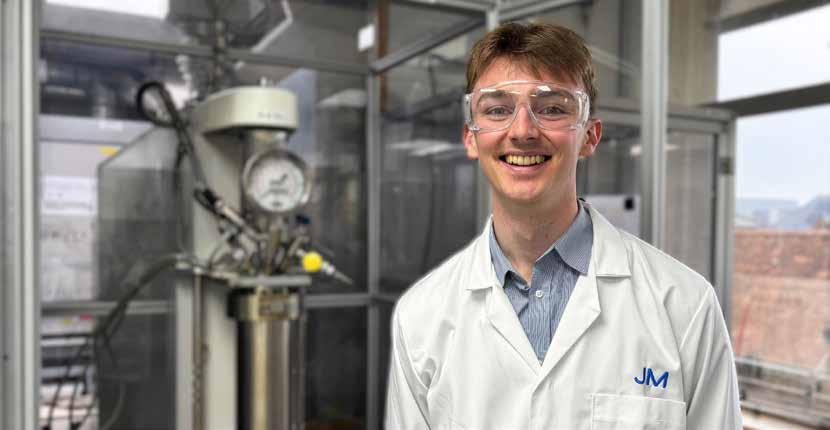
Supporting Bursaries at Magdalene
by Professor Russell Napier (1988)

‘Hard work and intelligence are the sources of financial reward’ is an often used retort of the successful. It is of course untrue. For everyone, even those born into the most advantaged backgrounds, luck plays an incredibly important role.
There is thus an element in anyone’s success that relates to good luck and there is often an element of bad luck in those not so materially successful. In supporting bursaries at Magdalene, I don’t see myself at distributing wealth but re-distributing luck. Getting some good luck early in life, perhaps a scholarship, perhaps being born into a loving and supporting family, is incredibly important in creating the foundations for greater opportunity and often of success. As the first generation in my own family to go to university, I realise how lucky I was to be in a catchment area for a very good grammar school in Northern Ireland and of course to pass the entrance examinations. That we had moved to a peaceful seaside village from what was then a dangerous area of Belfast in 1971 was also incredibly lucky. I was also born into a very supportive family. To list the luck in my career in financial markets would create far too long a read but you get the gist.
I strongly encourage others who have been lucky in life to try to redistribute some of it to others as it may be for you too. In my experience, and I know of many others too, virtually nobody stops providing such support once they have begun providing it. The truth, one rarely spoken, is that the donor gets major benefits from supporting others. In the case of funding scholarships and bursaries for young people it means communicating with a different generation, young people who can make a difference in the world and make things better.
Cambridge graduates have worked throughout my lifetime, born in 1964, not long after the Cuban Missile crisis, to make the world a better and a safer place. They will continue to do and we can help support that new generation and the hope that comes with it by supporting those who need a bit of help along the way before making their contribution.
I STRONGLY ENCOURAGE OTHERS WHO HAVE BEEN LUCKY IN LIFE TO TRY TO REDISTRIBUTE SOME OF IT TO OTHERS AS IT MAY BE FOR YOU TOO. IN MY EXPERIENCE, AND I KNOW OF MANY OTHERS TOO, VIRTUALLY NOBODY STOPS PROVIDING SUCH SUPPORT ONCE THEY HAVE BEGUN PROVIDING IT.
My charitable giving began in 2001 following the death of my wife, a Cambridge graduate, at the age of thirty-one. In her memory, I have since then distributed some of the luck that has accrued to me that tragically did not accrue to her. To each recipient of the bursaries a little luck is redistributed and they then, through their hard work and intelligence, may be lucky enough to be in a position to redistribute that luck to someone else. It’s a privilege to be part of the process that sees luck, even in some small way, re-assigned. Try it. If you don’t like it- stop.
The Changing Postgraduate Landscape
by Professor Klaus Okkenhaug (2022), Postgraduate Tutor
There are about 200 postgraduate students at Magdalene who enrich the academic and social aspects of the College in innumerable ways. Roughly split between Master’s and PhD programmes, their research spans the full breadth of disciplines – from the sciences to the humanities – reflecting the rich academic landscape of the wider University.
These students are at the heart of Cambridge’s academic life. Many are supported by funding from organisations such as the Cambridge Trust, UK Research and Innovation, the Wellcome Trust, Cancer Research UK, and others.
However, funding is becoming ever more competitive and the cost of enrolling in the various courses as well as the cost of living are increasing at a rapid rate. Some organisations, such as the Wellcome Trust, are reducing the number of studentships they offer.
Postgraduate students at Magdalene are therefore fortunate to be able to apply for scholarships and bursaries provided by College.
Through the generosity of alumni and other benefactors, we are able to attract and support students who otherwise would not be able to come to Cambridge to benefit from the rich and rigorous academic research environment we have to offer. In addition, we are able to contribute funding for research trips
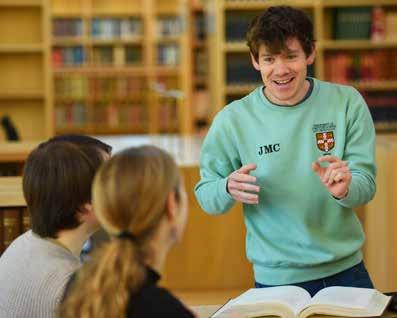
and conferences, and in the case of PhD students, contribute to 4th year funding – often required by students to successfully complete their thesis work.
We are also fortunate to be able to offer College accommodation to the majority of students. They are represented by a dynamic MCR committee which is also represented at the Governing Body meetings.
As a Postgraduate Tutor it is wonderful to learn about their research progress and witness the enthusiasm and dedication to their respective areas. They are a vibrant community of students who enrich the College in many ways. We are grateful for the support from alumni who makes this all possible.
Rising Trend in Self-Funded Postgraduate Studies
Graph showing the increase in self-funded postgraduate studies due to a decline in available bursaries, grants, and government funding.

Supporting Postgraduate Students
by Mr Tom Ng (1989)
A few years ago, during one of the College’s many visits to Hong Kong, the Development Director and I spoke about the competition between Cambridge and the top US universities. We reflected on how impressive it is that Cambridge continues to rank consistently among the top five universities globally. This is no small achievement, especially considering the vast difference in financial resources between Cambridge and competitors like MIT, Harvard, and Stanford. The disparity is even more acute if looked at from the perspective of the less well-endowed Colleges at Cambridge.
No doubt many readers will agree what makes our university one of the world’s best is the quality of the research conducted, by professors, academics and research students alike. At the heart of it are our PhD students, some of whom will pursue a career in academia beyond the successful completion of their respective PhD thesis. Not dissimilar to our need to recruit the very best undergraduates to our university, we need to do likewise with our research students. Most PhD students are on three-year grants provided by the various funding bodies who generally still expect students to complete their PhD thesis within that time period. However, it is more the exception rather than the norm, and it is not uncommon for postgraduates to continue their studies well into their respective fourth year. Disruption caused by the pandemic has also meant that some
students were unable to progress with their substantive work as access to labs had, for considerable periods, been restricted.
The harsh reality of limited financial resources had meant that PhD students in their fourth years had to self-finance their work, or risk years of good work going to waste. Not only would this have a devastating effect on the PhD students concerned, it would also undermine our College and the university’s ability to attract and retain the best people in our quest to contribute new knowledge to mankind, and be amongst the very best academic institutions in the world.
It is against this backdrop that the Ng 4th Year PhD Fund was conceived with the sole objective of helping fourth year PhD students. The bursary has been running for 6 years and to date, has benefited more than 35 Magdalene fourth year PhD students, some of whom have indicated that they would not have been able to complete their work but for the help made available to them.
Magdalene has provided me with a first-class education and provided me with solid ground to develop my career over the past three decades. Attending Magdalene has been a real privilege, and it is an honour for me to give something back to the College community and say thank you.

a
dispatch from the VALERIE ELIOT BEQUEST
Dr Michelle Taylor (2024), Armstrong T. S. Eliot Research Fellow
Among the over 200 translations of T. S. Eliot’s work in Valerie Eliot’s bequest to Magdalene College is Henri Fluchère’s French translation of Murder in the Cathedral, printed in Switzerland in 1943 for Albert Béguin’s series Les Cahiers du Rhône. I find it exhilarating to imagine Eliot’s abstract tragedy of Anglo-Catholic church history in the context of the French Resistance, nestled in Béguin’s literary list alongside writers like Louis Aragon, Paul Éluard, and Saint-John Perse (whose Anabase Eliot himself had translated in 1930). It is, of course, another archival thrill entirely to see Eliot’s marginal ‘NO!’ next to a quoted translation of The Hollow Men in Fluchère’s explanatory essay.
My research, as Magdalene’s inaugural Armstrong T. S. Eliot Research Fellow, examines both T. S. Eliot’s philosophy of translation and his history of being translated – often, I am finding, in service of some kind of
cultural diplomacy, as with Béguin and Fluchère. Eliot is a good figure with whom to think about translation, and by extension the twentieth-century construction of ‘world literature’, not only because of his dialectical way of acting and thinking (about translation and about everything else), and not only because his work underwent so much translation both in his lifetime and after, but also because he is at the same time a polyglot and a philosopher-errant (the best kind).
Magdalene’s collections, however, were my initial inspiration for the project, since they contain an extraordinary variety of his works in translation; my second has been the small intriguing histories like these that started to pop up when I began to look, in a very nonempirical way, at the patterns of Eliot’s translations, at least in book form. I was surprised by the preponderance of drama in the collection and in Eliot’s history of translation,
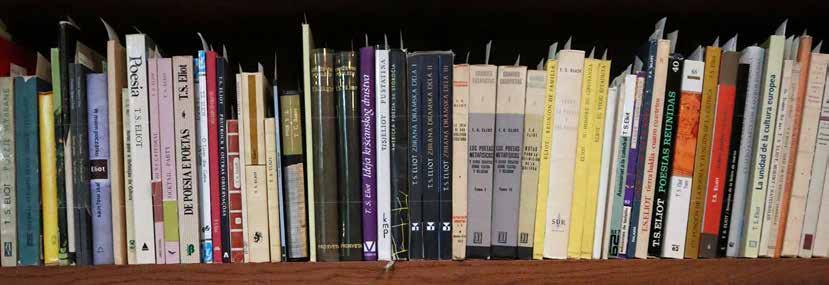
though perhaps I should not have been. Consider some of the international translation and performance history of Murder in the Cathedral: in French, in Paris, in 1945; in German, in Berlin and Cologne, in 1946; on the BBC East India Service in Hindustan, in 1948; and at the National Theater of Northern Greece in 1967 – the first year of the military junta. (This last performance is of special interest to me, a third-generation Greek American, a heritage learner of the language, and a general enjoyer of the work of George Seferis.) Eliot’s work had ends outside of England and English that may not have felt so apparent to audiences who saw the play, for example, when it was first performed
on site at Canterbury Cathedral. But there is much in the play that would seem to lend itself to translation – his choice of Ancient Greek drama as a backbone, for example, which incorporated a set of tropes already recognised as open to the particular modes of reading that for David Damrosch constitute the world literary ‘classic.’ Eliot’s drama is, admittedly, not much favoured today – other works seem more representative of his century-defining poetic gifts. Thinking about these works as potentially more open to translation and to global spread, however, opens up new ways we can appreciate not only their role in literary history, but their achievements as literary works.
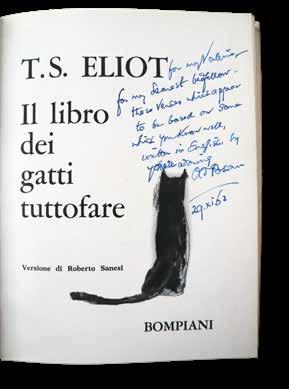
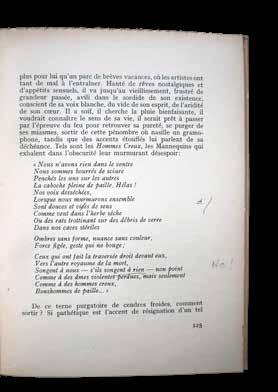
Handwritten annotations by TS Eliot, including a message to his wife Valerie, on an Italian translation of Old Possum's book of practical cats in the Old Library.
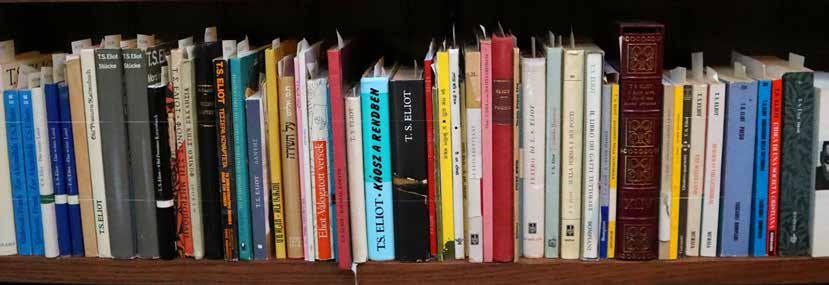
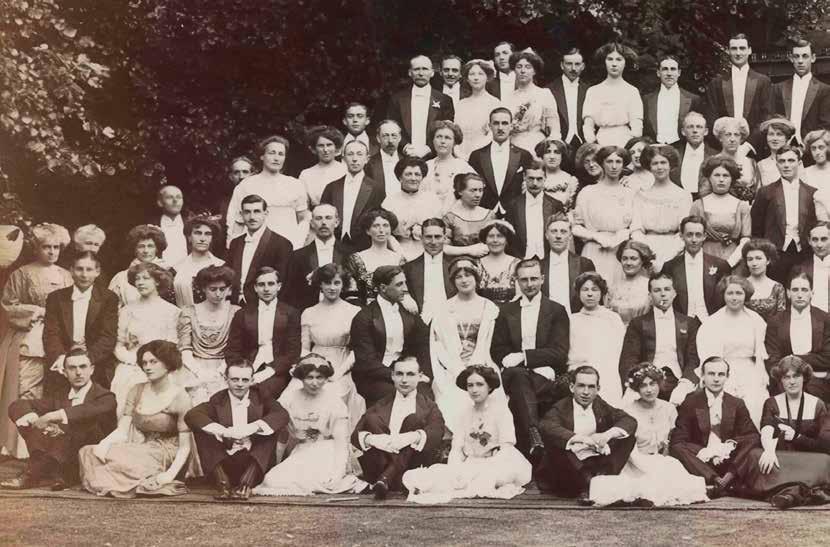
A NIGHT TO REMEMBER: Looking Back at Magdalene’s May Balls
by Mr Connor Johnston, Graduate Trainee Librarian
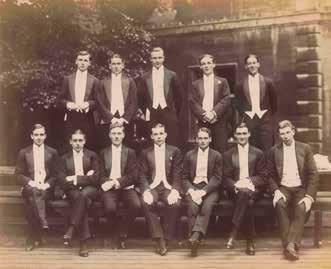
Magdalene’s latest May Ball, set to take place this summer, promises to celebrate a ‘journey intertwining past and present.’ With history and tradition taking centre stage this year, now is a perfect opportunity to dip into the College Archive and explore the story of Magdalene’s May Balls.
The first May Ball was held by Trinity College in 1866 to celebrate the end of May Bumps, hence its name, which was retained even after the date was changed to June in 1882 so that it would take place after exams. By this time, the tradition had spread to many other Colleges, and Magdalene held its first May Ball in 1911. It was supposed to be held a year prior, but King Edward VII’s death sent the country into mourning and the event was postponed. Our first ball featured a ‘marquee gaily bedecked with streamers of green and white’ and shawls, provided ‘for protection against the dewy morn’.1
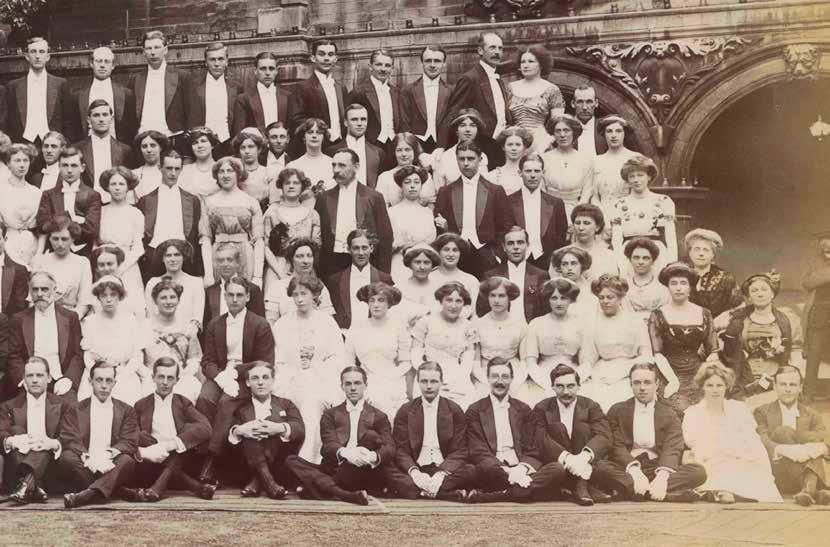

It was held again the next year, and then again in 1914, on the condition ‘that Morris Dances will not figure in the Programme’.2
Owing to WW1, another Ball was not held until 1920, where various punts and other boats were brought ‘so that the delights of the river may be added to the other attractions of the night.’3 The tradition of capitalizing on our riverside location continues today, as modern Magdalene students are given the option to make their dramatic entrance by punt.
With this early success, May Balls quickly became a Magdalene staple, and in 1929, advice is given for ‘The Gentleman in May Week’ in the College Magazine. Particularly useful is a section on horse riding: ‘If the lady be light, you must take care not to give her too much impetus in mounting. We have known a lady nearly thrown over her horse through misplaced zeal of this kind.’4
A lot has changed in the space of a century. One notable difference over time has been the food, as demonstrated by the menu from 1938.
Few menus would feature ‘Langue de Boeuf’ today! Much less ‘aspic’, which the Secretary’s notes from 1928 tell us was in overabundance.
But some things always stay the same. For example, our May Ball remains a white-tie-only event – the last of its kind. Equally unwavering is the quality of entertainment, from Herr Moritz
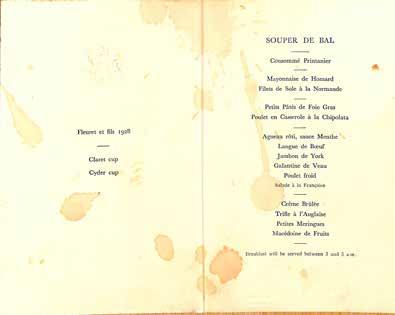
Wurm’s Band (1911) to Mungo Jerry (1975) to Michael McIntyre (2007). Standing on the shoulders of its predecessors, this year’s May Ball promises to be a night to remember.
1. College Magazine, Vol 1, No. 7, December 1911, p. 18
2. College Magazine, Vol 3, No. 3, June 1914, p.285
3. College Magazine, Vol 5, No. 2, June 1920, p.91
4. College Magazine, Vol 9, No. 3, June 1929, p.87
If you have any memorabilia from past May Balls that you would like to donate to the Archive, please contact us at archives@magd.ac.uk.
The first Magdalene May Ball in 1911.
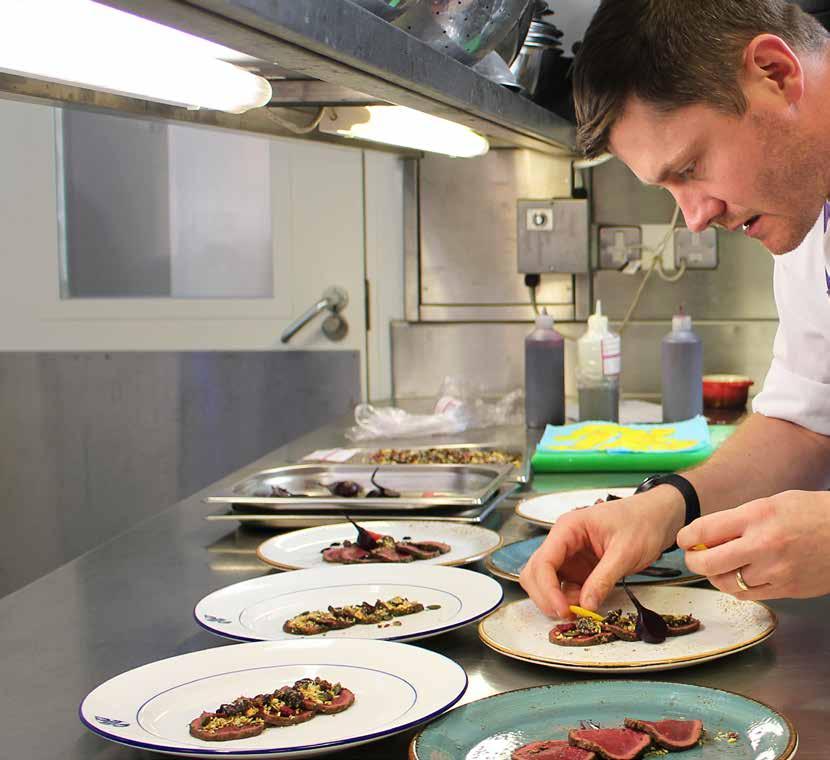
WAYNE JOHNSON
INSIDE THE MAGDALENE KITCHENS
With over 25 years of experience working in Magdalene’s kitchens, Wayne, the College’s Head Chef, has witnessed first-hand the transformation of both the kitchens and the dining experience. We sat down with him to reflect on his journey, the challenges of managing a busy kitchen, and what makes dining at Magdalene special.
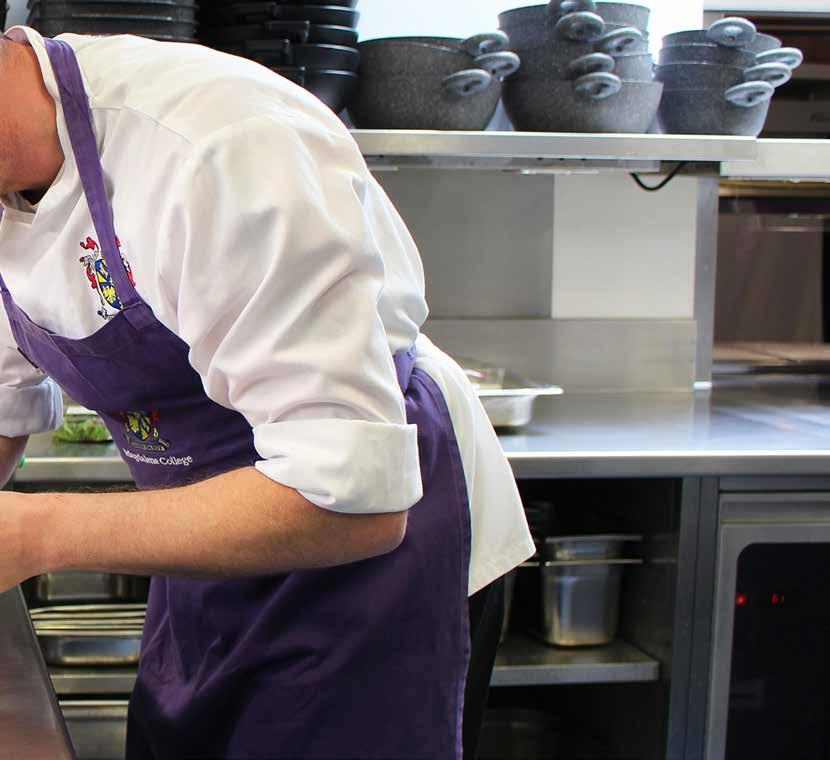
Q What’s your first memory of cooking or being in a kitchen?
I remember being a little boy, standing on my Grandma Jean’s stool in the kitchen, icing buns for the rest of the family to enjoy. That was my first real taste of how much I enjoyed being in the kitchen.
Q Tell us how you started at Magdalene and what your first role was like.
I first came to Magdalene for work experience in 1997 at the age of 18 while training as a chef at catering college. I spent a week in the kitchens and another in front of house. The Head Chef didn’t have any full-time roles, but the Catering Manager offered me some casual shifts, which I gladly accepted.
I started as a casual waiter, then moved into the kitchen. Since the Magdalene work was ad hoc, I also worked in local
restaurants, often pulling long hours. Eventually, a junior chef role opened up here, and teenage me jumped at the chance.
I started with basic prep and sauces, gradually over the years progressed through the ranks, becoming a Senior Sous Chef in 2016 and then Head Chef in 2020.
Q How has the kitchen and dining experience at Magdalene evolved over the years?
It’s changed massively. When I started, the kitchen still had old gas ovens, now it’s a fully electric, high-tech kitchen with selfcleaning equipment. The big kitchen refurbishment in 2012 was a game-changer.
The menu has also evolved. Back then, vegetarian options were rare, but now around 40% of diners have dietary requirements. We’ve embraced this, catering for gluten-free, dairy-free, nutfree, and more complex requests.
The team has grown more diverse too. When I first started, it was all British chefs. Now, we’ve got an incredible mix of nationalities – French, Brazilian, Spanish, Italian, and Hungarian. The variety is fantastic, they bring their own culinary styles, techniques, and ideas and I absolutely love it, we all learn from each other.
Q What are some of the biggest challenges of running a busy kitchen and dining hall today?
Running a kitchen like this comes with plenty of challenges. One of the biggest is juggling the logistics of working across two sites – the College kitchen and Cripps Court kitchen. When I started, everything was based in the main kitchen. Now, we’re constantly moving between the two, splitting the team and coordinating deliveries.
IT’S THE COMBINATION OF TRADITION, CREATIVITY, AND GENUINE CARE. WE DON’T JUST MAKE FOOD – WE WANT IT TO BE MEMORABLE. FOR ME, IT’S ABOUT MORE THAN THE FOOD – IT’S THE ATMOSPHERE, THE EXPERIENCE, AND THE PRIDE WE TAKE IN EVERY PLATE.
Staffing is another challenge. These days, I spend more time managing people than cooking. Most of the service is handled by the sous chefs, but when we’ve got big events, like reunions or College feasts, that’s when I’m back on the stoves.
Despite the challenges, it’s the camaraderie that keeps it going. The kitchen is a bit of a controlled chaos, but that’s part of the fun.
Q You’ve cooked for some incredible events. Are there any moments that stand out?
There have been so many unforgettable moments. One of the biggest highlights was when Nelson Mandela visited in May 2001. I still remember the date – Wednesday 2nd May. I only met him briefly, but shaking his hand was surreal. Watching the Fellows and guests attempting a traditional dance in Hall was equally memorable – you don’t often see the Master cutting loose like that!
Hosting the Dalai Lama was another incredible experience. I ended up being his personal chef during his visit. He was so gracious and humble, always grateful for whatever was served. One moment that stuck with me was when his security invited me to share a meal with them. They brought out this, unknown to me, incredibly spicy dish; it nearly blew my head off! We all had a good laugh.
Q Have there been any surprising or unusual requests from guests over the years?
Plenty! Once, while catering for a dignitary, the security team was so on edge and they were constantly watching us in the kitchens. I reached for a knife and suddenly security was on me, demanding to know what I was doing. I was just slicing vegetables!
We’ve also had some quirky culinary requests. When a film crew came to shoot a documentary about Samuel Pepys, we had to recreate period dishes – potage, mushrooms on toast with pickled walnuts. Surprisingly tasty, but definitely a departure from the usual menu.
And then there’s the rice pudding tradition, a tribute to Bernard Saunders, a former Magdalene Fellow in Chemistry. Due to health issues from testing nerve gases during WWII on himself, he could only stomach simple foods, and rice pudding was one of the few things he could eat. It became a permanent (unwritten) fixture on the Formal Hall dessert menu. Even now, it’s always available, you just have to ask for it.
Q What do you think makes dining at Magdalene special?
It’s the combination of tradition, creativity, and genuine care. We don’t just make food – we want it to be memorable. For me, it’s
about more than the food – it’s the atmosphere, the experience, and the pride we take in every plate.
The themed formals are a highlight. We put a lot of thought into them – Valentine’s, Lunar New Year, the Easter Banquet, to name just a few. It’s not just about the food; it’s the whole experience. The buzz in the kitchen when we’re working on something creative is brilliant.
Q What’s next for the Magdalene kitchens and dining service?
Sustainability is a big focus for us. We use local, seasonal ingredients whenever possible. Our meat comes from a butcher just outside Cambridge, and our fish is from a sustainable supplier. We’ve reduced daily deliveries to lower our carbon footprint and cut food waste by refining our portioning and ordering. I want us to keep building relationships with local farmers and suppliers, using even more seasonal, high-quality produce.
I also want to keep pushing the creative side. Themed formals and special events give us a chance to be imaginative, but I’d like to bring that flair into more of the day-to-day dining too – new techniques, bolder presentation, and fresh flavour combinations.
Staff development is another priority. It’s important that the team keeps growing their skills, whether through courses, supplier visits, or just more creative freedom in the kitchen. A motivated team makes better food – it’s as simple as that.
Q Finally, after so many years at Magdalene, what keeps you passionate about your work?
Honestly, it’s the people. The kitchen team is like a second family. We all look out for each other, and seeing their dedication and creativity makes me want to keep pushing myself too.
But beyond that, it’s the pride in what we do. I love the idea that someone could come to Magdalene and remember the meal they had here years later.
When I see the team buzzing after a big event, knowing they’ve pulled off something fantastic, it makes me genuinely proud. We occasionally get lovely emails from alumni and students saying how much they enjoyed the food, and I always pass that on to the team. They work incredibly hard – sometimes prepping for three days just for one dinner – so getting that recognition means a lot.
At the end of the day, I just want Magdalene’s dining to be something people talk about – a place with a reputation for genuinely fantastic food and warm, welcoming service. That’s what keeps me coming into the kitchens every day.
The Definitive selection from A.C. Benson’s Diaries
by Professor Eamon Duffy FBA (1979), Emeritus Fellow
Begun in depression in the 1890s, at a time when he thought of himself as “one of those unhappy invalids who keep diaries”, the diary of A C Benson, became a regular, copious and vivid record of his daily doings, likes and dislikes, personal encounters and assessments, and, often, of his vexations with friend and foe alike.
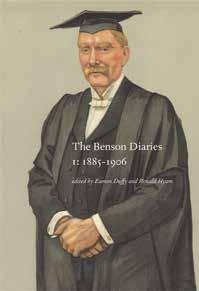

It would ultimately swell to more than 23,000 manuscript pages in 180 volumes, perhaps closer to five than four million words. For comparison, Pepys’ diary is just over one million words, the Authorised Version of the Bible a mere 783,137.
Everything Benson experienced, thought and did, and everyone he met, found their way into the diary. His successive roles – son and biographer of Queen Victoria’s favourite Archbishop of Canterbury; the most prestigious housemaster in the most prestigious of late Victorian public-schools; unofficial poet-laureate to the royal family, editor of Queen Victoria’s letters, bestselling popular journalist, Master of a Cambridge College, alderman of a city livery company – these roles gave him unique entrée to late Victorian and Edwardian society. The diary abounds with major set-pieces – Christmas with the royals at Claremont House, the funeral of Gladstone, dinner with Queen Victoria, the coronation of Edward VII, a day with the poet Swinburne and his preposterous minder Theodore Watts Dunton, a weekend at Lamb House with the novelist Henry James, a visit to Thomas and Emma Hardy at Max Gate. Among the major and minor celebrities who figure in the diary were Queen Victoria, Edward VII, George V, and Queen Mary: every Prime Minister from Gladstone to Winston Churchill, the poets Hardy, Housman, Yeats, Bridges, and Rupert Brooke, novelists Henry James, H G Wells, E M Forster, artists William and Ben Nicholson, Max Beerbohm, and John Singer Sargent: the
musicians Edward Elgar, Ethel Smyth, Hubert Parry, Charles Villiers Stanford and Arnold Dolmetsch: and many more.
But the diary is far more than a who’s who of late Victorian and Edwardian celebrity. It derives its unique flavour from the opinionated, sardonic and irreverent personality of the diarist. Benson once listed his requirements for a truly entertaining conversation –“I want prejudice, preference, humanity, humour, malice, salinity, a hundred little spices in my dish”. That was why he relished the conversation of his favourite aunt, Emmeline, “full of zest, partisanship, fury, envy, jealousy, vindictiveness – all very wholesome”. His diary is “wholesome” in every one of those ways: sharp observation, humour, malice and saltiness make it, vast as it is, so entertaining to read.
Now, for the first time, a lavishly illustrated 350,000 word selection, introduced and annotated by two major historians, Professor Eamon Duffy FBA (1979) and Professor Ronald Hyam (1960), reveals the full range and zest of this marvelous panorama of English society, before, during and after the First World War. The Benson Diaries: I: 1885–1906; II: 1907–1925 will be available to purchase from leading booksellers from summer 2025.
The Benson Diaries: I: 1885-1906; II: 1907–1925
Publisher: Pallas Athene ISBN: 9781843682677 www.pallasathene.co.uk/shop/ bensondiaries
Helping Students Write
by Professor Ruth Padel (2024), Royal Literary Fund Teaching Bye-Fellow
Since October, I’ve been sitting for two days every week in a low-beamed attic above Magdalene Lodge meeting students who want to make a piece of writing stronger. I’m employed by the Royal Literary Fund, a body with a Royal Charter, founded in 1790 simply, at first, to help writers. Coleridge was its first beneficiary. It has funded Joseph Conrad, James Joyce and Doris Lessing since, among many others, and acquires its own money from legacies. It now works all over the UK to place writers as ‘Writing Fellows’ in Higher Education institutions, to help students with academic writing. Tutors have their hands full teaching their actual subject, but many schools never really teach students to write an essay. Some are fine when they reach university, but many struggle. They speak their own language perfectly well, but while reading complex academic papers for their course, they often find it fighting them on the page.
I have taught Greek and poetry in my time, but as an RLF Fellow I am simply a writer. My brief is not to engage with the subject of an essay but concentrate on all aspects of writing it. Building the argument, citing supporting evidence, deft uses of paragraph and cadence, grammar and punctuation. Whatever level a student is, I try to help them polish their writing for life. Anyone in College can come. If the Master wanted help with a paragraph on international law, or the gardener with a tractate on chrysanthemums, they would be welcome. But mostly I get graduates and undergraduates. Some come because their supervisor recommended it, but most just wish to make a piece of writing better.
News of this service spreads gradually through students doing different subjects. I had a spate of archaeologists, then medical students, historians, lawyers, neuroscientists, psychologists and philosophers. Now English students are coming. This week, I saw twelve students over two days.
WHATEVER LEVEL A STUDENT IS, I TRY TO HELP THEM POLISH THEIR WRITING FOR LIFE. ANYONE IN COLLEGE CAN COME. IF THE MASTER WANTED HELP WITH A PARAGRAPH ON INTERNATIONAL LAW, OR THE GARDENER WITH A TRACTATE ON CHRYSANTHEMUMS, THEY WOULD BE WELCOME.
For some, one session once is enough. It is such a pleasure to watch them get the point. “Oh yes — I see!” Others keep coming back, especially those on an M. Phil. course, where they get less personal teaching.
It makes me realise how varied all the teaching is, proceeding silently behind the College’s pale walls. I learn how diagnoses of autism consider the different ways in which autism shows itself in girls, how the Mughals fared in the Deccan in the seventeenth century and women wrote up their travels in the eighteenth; the role of shrunken heads in pre-Columbian Amazonian societies and the molecular structure of the best material for knee replacements. I’m working on a document myself about writing an essay which I thought I might offer the College at the end of my two years, in gratitude for being allowed to play a tiny part, for a while, in such a warm and supportive community of learning.
iProfessor Ruth Padel (2024) is a poet, novelist and non-fiction author, Fellow of the Royal Society and the Zoological Society of London, Professor of Poetry Emerita at King’s College London. Her poetry collections include Darwin, a Life in Poems, about her great-great-grandfather Charles Darwin. While Royal Literary Fund Fellow at Magdalene, she is also finishing a non-fiction book on elephants and the environment. Find out more at www.ruthpadel.com
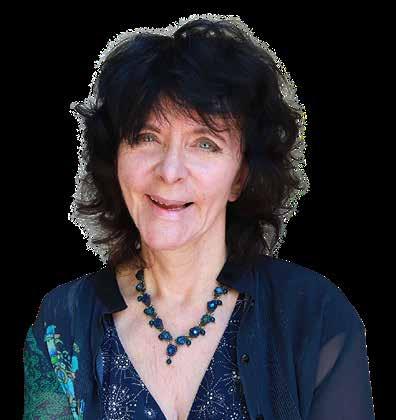
reflection on the role of the president
by Dr Nick Carroll (2017), President
Statute X: 1: The Governing Body shall by special resolution appoint one of their number to be President of the College……Well, I had not thought, until I walked back into the Governing Body meeting to hear the news of my election that I would ever become the President.
The immediate feeling was one of enormous pride in following a long line of distinguished senior colleagues mixed with apprehension and a strong dose of imposter syndrome that I should have been chosen.
The role of President is complex but is based on the second item in statute X that ‘the duty of the President is to attend under the Master to the good government of the College and the observance of the statutes and to study and promote the welfare of the Fellows’.
My priority has been to strengthen and support the Fellowship, ensuring their well-being within the College. I have focused on rebuilding the Fellowship after the disruptions of the pandemic and financial challenges.
As President, I chair, convene, and serve on various committees and also represent Fellows without a Governing Body seat, such as Junior and Senior Research Fellows and other non-GB Fellows. As convenor of the Fellowship Committee, I oversee recruitment for the Junior Research and Bye-Fellowship programmes, manage Visiting Fellowships, and coordinate the election of Governing Body and Senior Research Fellows. I also handle nominations for Honorary Fellowships and oversee Fellows' admission ceremonies.
Over the next two years, a key task will be organising the Mastership election, overseeing the election and its outcome.
The role also includes many social responsibilities. As President, if I attend dinner in Hall, I must say the traditional 27-word Latin grace and ensure the closing grace is said in the Master's absence. I maintain contact with former Fellows, non-resident Honorary Fellows, and partners of deceased Fellows, inviting them to various special functions such as the Christmas lunch.
In collaboration with the Dean of the Chapel and others, I organise special commemorative events such as memorial services, anniversaries, and public lectures. I also have
a stall in the Chapel, where a plaque will one day mark my time as President. One of my more challenging responsibilities is reciting the list of benefactors at the Commemoration of Benefactors service (with much help from Sarah, our Dean of Chapel, in pronouncing many of the names) and reading a lesson when needed.
Additionally, I must remember to ‘fly the flag’ (literally). With the Porters' help, I arrange to fly the College or Union flag on the required days.
Not every small detail of the role has been included, but this provides a broad overview of the many responsibilities held by the President. I have most enjoyed my close liaison with the Master, Fellows, and staff, building good working relationships and lasting friendships.
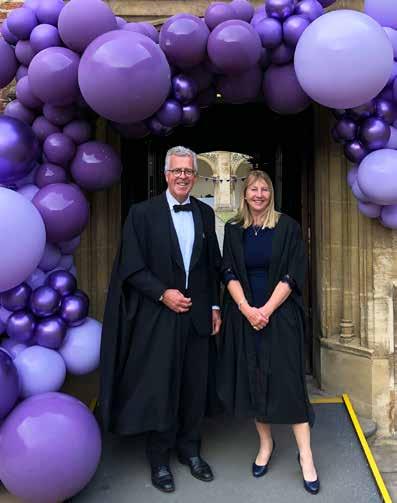
FELLOWS’ NEWS

Professor Brendan Burchell (1990)
Professor Brendan Burchell was awarded the UK Research and Innovation ESRC Outstanding Business and Enterprise Impact Award for his research on the four-day work week. Leading the Digit Working Time Reduction Team, the research provided evidence of benefits for both employees and employers, influencing businesses across the UK to adopt reduced working hours.

Professor Tim Harper (1990)
Professor Tim Harper has been elected as a Fellow of The British Academy, joining a distinguished group of over 1,700 scholars in the humanities and social sciences. Professor Harper is Head of Cambridge’s School of the Humanities and Social Sciences, a Director of the Centre for History and Economics, and College Lecturer in History at Magdalene. His research focuses on modern Southeast Asia and its global connections.

Professor Paul Dupree (1996)
Professor Paul Dupree has been recognised as a Highly Cited Researcher for 2024, marking his ninth selection in the past decade. This prestigious recognition is awarded to researchers whose work ranks in the top 1% by citations in their field. Of the world’s scientists and social scientists, only 1 in 1,000 receive this honour, reflecting his significant impact and recognition.

Dr Allègre Hadida (2003)
Dr Allègre Hadida chaired and hosted the 25th anniversary Mallen Conference and the inaugural Mallen PhD Symposium at Magdalene in September 2024. The Mallen Conference is an annual gathering of leading global scholars and industry professionals exploring the management, business, and economics of screen entertainment, including film, television, streaming, and video gaming. Together, they examine the mechanisms and processes behind the successful creation, management, and marketing of screen content. This milestone event brought together 70 screen entertainment scholars and professionals for a highly successful and engaging conference.

Dr Philippa Steele (2010)
Dr Philippa Steele has been exploring how ancient scripts like Cypriot Syllabic offer insights for preserving endangered languages. Her work with the VIEWS project has highlighted the importance of visibility and cultural identity in writing. Through the Endangered Writing Network, experts and communities have collaborated to protect linguistic and script diversity.

Professor Paul Lane (2018)
Professorial Fellow Professor Paul Lane is leading the Mapping Africa’s Endangered Archaeological Sites and Monuments (MAEASaM) project, which has been awarded £5.7 million from Arcadia to continue its work for another five years. The project uses remote sensing, field surveys, and archival research to document and protect endangered archaeological sites across Africa. Since its launch, MAEASaM has identified over 67,000 sites and digitised 31,000 historical records, helping heritage professionals map and monitor these important locations.

Dr Sara Caputo (2019)
Dr Sara Caputo’s book, Foreign Jack Tars: The British Navy and Transnational Seafarers during the Revolutionary and Napoleonic Wars, has been awarded the prestigious Royal Historical Society Whitfield Prize for the best first book in British or Irish history. The prize is given annually to the best work on a British or Irish history subject published in the UK or Republic of Ireland. It recognises first monographs by early career historians.

Dr Adrian Baez-Ortega (2020) Senior Research Fellow
Dr Adrian Baez-Ortega has been awarded a prestigious European Research Council (ERC) Starting Grant. These highly competitive grants, awarded to just 14% of applicants, provide €1.5 million over five years to support early-career researchers in launching innovative projects. His research investigates longterm tumour evolution and genomic instability in marine transmissible cancers.
JCR UPDATE
by Ms Karen Dias (2023), JCR President
The newly elected JCR have enthusiastically embraced their roles this term. Entertainment Officers Brad and Austen successfully hosted the first bop of Lent Term, with students impressing in creative costumes. We’re now looking forward to the end-ofterm Heroes and Neros bop and the inventive outfits it will bring.
LGBT+ History Month was marked with a range of events organised by the LGBT+ Officers, Celeste and Naomi. These included a mosaic tile craft night, a group trip to the ADC Theatre to watch Everybody’s Talking About Jamie, and weekly fact-files in The Magdazine highlighting significant but lesser-known LGBT+ historical figures. Meanwhile, Secretary Sophie has put her own stamp on The Magdazine, adding new puzzles, poems, and a touch of wry wit.
Planning for next year is already underway, with Freshers’ Reps Fabian and Pippa creating a full events calendar for the incoming freshers, while also organising the marriage formal for first years. Vice President, Emily, has provided strong support to the committee and introduced a new freshers’ pack outlining the JCR’s role and the support available to students.
Themed formals have been a highlight, thanks to the efforts of Catering and Accommodation Officer Olivia, who organised events for Lunar New Year, LGBT+ Formal, and International Women’s Day. The 1988 Society has also been revitalised by Women’s Officer Grace, who launched a new website and hosted
MCR UPDATE
by Ms Siobhán Johnson (2022), MCR President
We are proud that our postgraduate community in Magdalene is one of the most active in Cambridge. This is due to the hard work our committee has done to facilitate a fantastic range
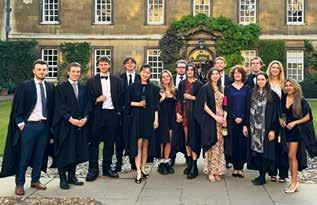
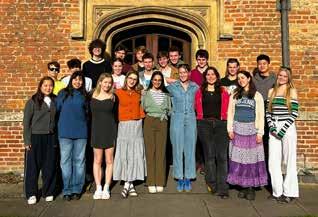
craft evenings in College. In collaboration with the Greens and Charities Officer, Ravi, she also ran a bake sale, raising funds for Jimmy’s Cambridge and Cambridge Women’s Aid.
Magdalene’s international community has enjoyed events such as a movie night and a hot pot night, thanks to the International Officers, Julie and Alex.
Student wellbeing has remained a priority, with Welfare Officers Sophia, Tristan, and Tom offering free hot chocolate, Week 5 welfare packs, and continuing the JCR NHS Prescription Scheme.
Improving communication and connectivity, the IT Officer, Douglas, has been enhancing the JCR website, while Class Act Officer Finn hosted a pub quiz with other Colleges to help students feel welcome. Treasurer Max has kept everything running smoothly by managing finances and making these events possible.
Lent term ended with the annual Magdalene-Magdalen Sports Day against Oxford. While we didn’t win overall, there were impressive victories in Ladies’ Netball, Hockey, Badminton, and Mixed Touch Rugby – all of which we are proud of. We can’t wait to host next year and take the win.
of events throughout the year. We’ve had a great year with a large incoming committee to keep the momentum going from the high of Michaelmas Term as well as enthusiastic members attending our events.
Some highlights include our annual Christmas Banquet, with its festive carol singing, and the Easter Banquet with its Bridgerton theme. Both were great fun as were the after parties in Benson Hall. We also had a great MCR turnout at the annual MagdaleneMagdalen Sports Day, held in Oxford this year. We’ve also had great demand for dancing evenings, with two ceilidhs and a sokkie-evening where our South African members taught others how to ‘sokkie’. Lastly, our termly pub quiz in the College Bar has been a favorite for all members, with our Vice-President Frances leading them with creative and engaging categories.
The warmer spring air brings an Easter Term with more essays and exams, but we are already planning ahead to help students recharge in their studies and celebrate once deadlines have passed. We particularly look forward to our new Summer Garden Party to start off May Week and enjoying the sunshine after the hard work of exams.
The 2025 JCR Committee.
MCR Swap.
YEAR S FORT Y

AT MAGDALENE BOAT CLUB
by Mr Paul Knights
Before becoming a boatman, I lived in the London area and rowed for Walton-on-Thames Rowing Club, competing successfully in many events, including winning a gold medal at the Ghent International Regatta in Belgium.
While serving as Magdalene boatman, I also took part in the British Indoor Rowing Championships in 1997–98, holding the British 40-plus lightweight record for two years. I later competed in the World Indoor Rowing Championships in Boston Massachusetts, where I won bronze in my age category.
I began working for Magdalene in 1984 after the previous boatman, Reg Pettit, retired. Roger Silk, the Lady Margaret boatman, encouraged me to apply. With a background in carpentry and joinery, along with my rowing achievements, I secured the role, and Roger taught me the necessary boat repair skills.
I lived above the current boathouse from its construction in 1987 until my retirement in 2024. Overlooking the Cam and Midsummer Common, it was, I must admit, a remarkable place to call home.
When I started as boatman, all the boats were wooden, requiring very different repair skills compared to the carbon fibre boats used today. The rowing oars were also wooden, making them much heavier than their modern counterparts. Although wooden boats had a certain charm, I didn’t miss them—they were constantly leaking, as the boards in clinker boats would shrink and expand with use. In my early days at Magdalene, a clinker boat had to be placed on the water the day before it was needed, allowing it to absorb water and swell to minimise leaks during racing.
In 1984, one of Magdalene's boats was called Wet and Willing, a clinker-built cedar-planked wooden eight from 1957. It had been damaged during one of the University bumping races, and repairing it was my first task. They raced it in the next bumping races but broke it again—this time so badly that it wasn’t worth fixing. I decided to have the bow section made into a cabinet, giving it a second life. Since I was born in 1957, it holds double sentimental value for me.
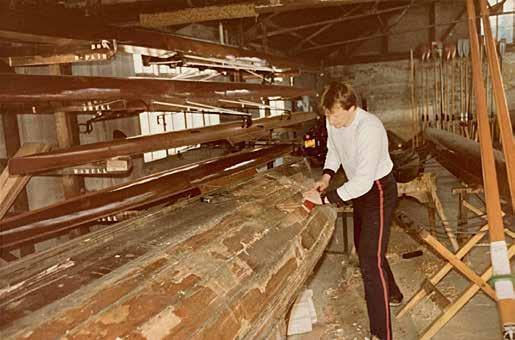
In 1986, the existing boathouse was set to be demolished on the Monday following the May Bumps. After the bump supper on Saturday evening several MBC members decided to go down to the boathouse and get a head start on the demolition themselves. However, the noise alarmed residents of Trafalgar Street, who assumed a break-in was underway and called the police. Officers arrived on site and detained several
Paul at work on a boat, repairing damage likely sustained during the May Bumps, c.1980s.
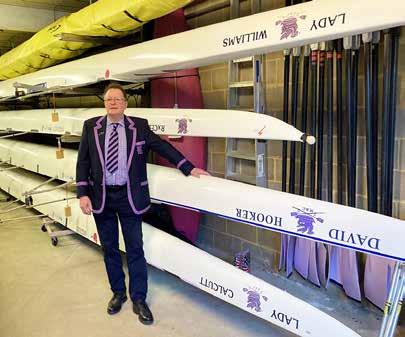
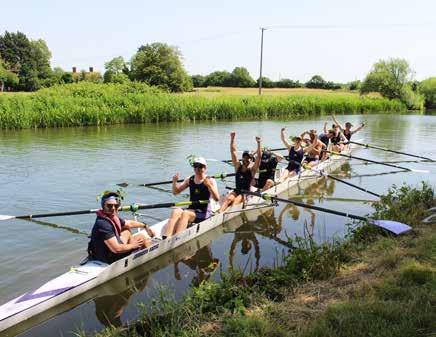
ONE LONG-STANDING TRADITION AMONG BOAT CLUBS IS THE STEALING OF OTHER COLLEGES’ BOAT CLUB FLAGS, WHICH ARE THEN MADE INTO BLAZERS. MAGDALENE IS PARTICULARLY WELL KNOWN FOR THIS, WITH THESE DISTINCTIVE BLAZERS APPEARING YEAR AFTER YEAR AT BUMP SUPPERS AND MAJOR ROWING EVENTS SUCH AS HENLEY ROYAL REGATTA.
MBC members. One particular member, a well known Rugby Blue, was asked for his autograph once inside the police van. All those involved had to report to the College Dean the following day. Fortunately, I managed to hide at the back of the boathouse – otherwise, my future as a boatman at MBC might have taken a very different turn!
The first women to row for MBC competed in the 1988 Bumps. Their first boat, The Mistress of Magdalene, was named by Barbara Calcutt, wife of the then Master, David Calcutt, who later became Sir David Calcutt – making her Lady Calcutt. That particular boat was named at the boathouse site, but these days, naming ceremonies take place in College in the Master’s Garden, where they are blessed by the College Dean of Chapel.
Sir David and Lady Calcutt often attended the May Races. On one occasion, I nearly ran over Sir David on my bicycle after
finding him fast asleep in the long grass by the bank. Lady Calcutt was a familiar sight along the towpath, supporting the crews from her three-wheeled tricycle—much to the frustration of other bank parties. She always dressed in Boat Club colours for events, even coordinating her eyeshadow, with one eye in lavender and the other in indigo.
One long-standing tradition among boat clubs is the stealing of other colleges’ boat club flags, which are then made into blazers. Magdalene is particularly well known for this, with these distinctive blazers appearing year after year at bump suppers and major rowing events such as Henley Royal Regatta.
Student rowers have changed over time, too. They are fitter, stronger, and undeniably taller. What was once considered tall is now the norm – most of the men are over six feet. Some are even 6’6” or more, prompting boat builders to adjust their designs to accommodate their height.
Looking back on my years at Magdalene, it's remarkable to see how much has changed – yet so much has stayed the same. Boats have evolved, rowers have grown taller and stronger, but the spirit of the club, its traditions, and the camaraderie remain as strong as ever. From wooden oars to carbon fibre, from clandestine flag blazers to rowers pushing new limits, Magdalene Boat Club continues to thrive. It has been a privilege to be part of its story, and I look forward to seeing where the next generation takes it.
Paul with modern fiberglass boats and MBC at the May Bumps.
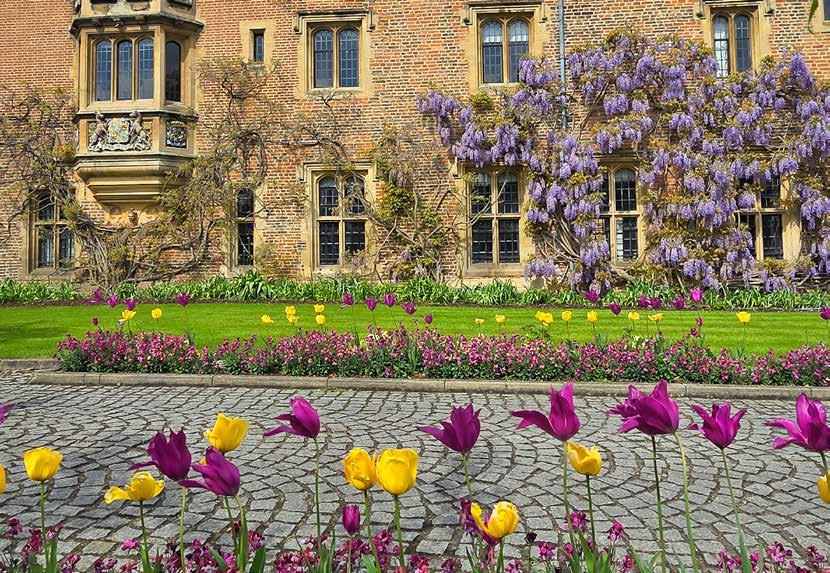
Upcoming Events
13 September
Members’ Dinner
20 September
10th, 25th and 50th Anniversary Reunion Dinner for 2015, 2000 and 1975 matriculands
17 October
NRM Night
29 October
Magdalene in London: Networking Drinks
8 November
NRM Night
14 November
Annual New York Dinner
28 November
NRM Night
@Magdalene
@Magdalene Alumni and Development Office Magdalene College Cambridge CB3 0AG
E alumni@magd.cam.ac.uk
T +44 (0)1223 332104
5 December
Annual Carol Concert in London
6 December
Benefactors’ Event: Festive Drinks with the Master
6 December
Master’s Guild Dinner
Please note that the above events may be subject to change.
Additional events may be added; please check www.magd.cam.ac.uk/events and look out for updated listings in Magdalene eMatters. If you are interested in attending an event or would like additional information, please email events@magd.cam.ac.uk
